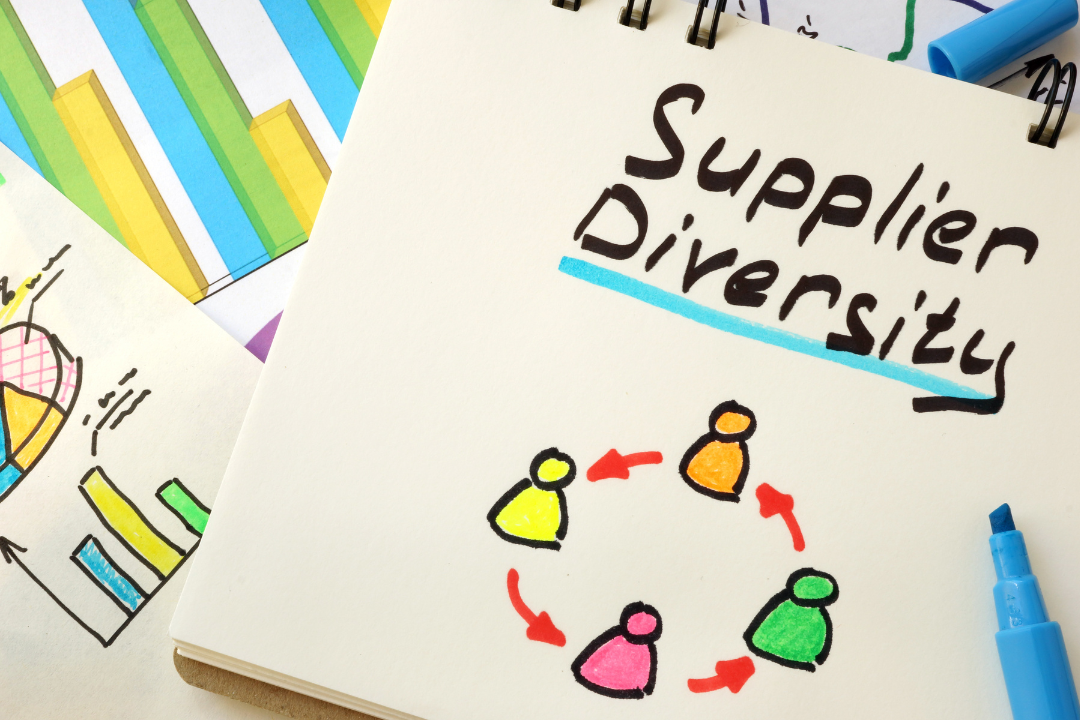Empowering Supplier Diversity: Translating Words into Action for Lasting Impact
Supplier diversity is not a new concept, especially to those organizations with increased awareness of their responsibility to diversity, equity, and inclusion (DEI). These organizations realize the positive impact they can have in addressing racial, gender, and other injustices through the implementation of strong supplier diversity programs. Prioritizing supplier diversity is indicative of a palpable shift from simple compliance and words to overall social and economic inclusion and action.
An organization is considered diverse when at least 51% of it is owned and operated by a traditionally underrepresented or underserved individual or group. If this business supplies a material or service, it can be considered a diverse supplier. Examples of common classifications that fall under this category include small business enterprises (SBEs), minority-owned enterprises (MBEs), and woman-owned enterprises (WBEs). The definition of a diverse supplier has also expanded to include other minority groups including LGBTQIA+, veterans, and those with disabilities.
The goal of supplier diversity programs is to procure from these businesses and to be inclusive of those that are more traditionally excluded from competing on the same level as others. These programs allow organizations owned by women, veterans, and other minority groups to ideally gain a more equal share of the market. This not only benefits them and the community at large but can also provide tangible benefits to the organization utilizing the supplier diversity program.
The Business Case for Supplier Diversity
Why is it important to include supplier diversity in your business strategy? Not only are supplier diversity programs a way in which an organization can cultivate and maintain its DEI initiatives, but the commercial advantages are even more far reaching. For example, according to Harvard Business Review’s article, “Why You Need a Supplier-Diversity Program,” UPS started their supplier diversity program in 1992 to bring to fruition a deep desire to be more inclusive and to do what is right. The company currently does business with approximately 6,000 small and diverse suppliers and spends $2.6 billion annually doing business with those suppliers.
Utilizing an inclusive procurement strategy allows for a larger number of potential suppliers to be considered, promoting competition, improving product quality, and driving costs down. Competition between diverse and non-diverse organizations alike also breeds innovation and allows small businesses to grow, resulting in growth in the local economy at the same time. When more diverse businesses are able to thrive and grow, the increase in diversity in the supply chain also allows the company implementing the supplier diversity program to expand more easily into markets with different demographics.
From a consumer standpoint, an organization that is known for successful DEI efforts can greatly increase consumer loyalty. According to Harvard Business Review, “In a 2019 study for Coca-Cola, Hootology, [a specialized marketing and consumer insights research firm] found that the individuals who were aware of Coca-Cola’s supplier diversity initiatives were 45% more likely to perceive the brand as valuing diversity, 25% were more likely to think favorably about the brand, and 49% were more likely to use Coca-Cola products.”
Overcoming Barriers and Biases
Even as more of corporate America implements supplier diversity programs, there remain challenges and hurdles that diverse-owned businesses often face. Difficulties accessing funding, being able to network easily, prejudices, and other issues are but some of the many barriers that small and diverse suppliers face. For these reasons, it is now more important than ever that these programs are more than just token gestures toward DEI initiatives. At its foundation, that means being more intentional in decisions and strategies rather than using programs as a reactive necessity.
Certification is a great way to help overcome some of these barriers. Going through a verification process that confirms and establishes the business as minority-owned is a necessity when a business is dealing with federal or state governments. There are also many programs and organizations that provide matchmaking events for those that have been certified with larger organizations that have supplier diversity programs. Further, some organizations utilizing supplier diversity programs also assist suppliers by offering support in the certification process, providing training programs, and creating mentoring relationships to help them meet the criteria. Although diverse businesses may be experts in their work, at times they have little experience in how to apply for an RFP (request for proposal) or how to prepare a bid for a contract. These types of resources help minority-owned vendors overcome this challenge by learning to comply with procurement requirements and standards.
Supplier Diversity in the Digital Age
In today’s digitally interconnected world, supplier diversity has taken on new dimensions. Digital tools and platforms allow for the discovery and engagement of diverse suppliers, which can then expand access to a broader pool of vendors. The matchmaking efforts discussed above are further facilitated through supplier databases and online marketplaces that enable organizations to identify and partner with businesses owned by women, minorities, veterans, LGBTQIA+ individuals, and more.
Additionally, more than ever, data analytics can now help assess the impact of supplier diversity initiatives on business performance and enhanced decision-making. The digital age also offers opportunities for capacity building and skill development among diverse suppliers. Online resources, training programs, and mentorship networks empower these suppliers to meet quality and technological requirements, fostering their competitiveness in the market. This approach increases inclusivity, promotes economic equity, and harnesses innovation.
Supplier diversity programs create long-lasting impacts when words are translated into action. It not only advances inclusion in the marketplace, but also affects the economy overall. By giving organizations increased competitiveness in the marketplace, their business grows, allowing for the creation of new jobs, increased wealth, and improved communities. Simply, more diverse supply chains help to build a future of business owners that accurately represents the multi-cultural society in which we live.
At The Win Woman, we focus on Environmental, Social, and Governance strategic development and policies for organizations of all sizes and funding opportunities for nonprofits. We work with boards and C-Suite executives to help develop the right solutions for their specific situation in their specific industry. For more information, please contact us.
Until next time, keep Building Your BADASSERY!



